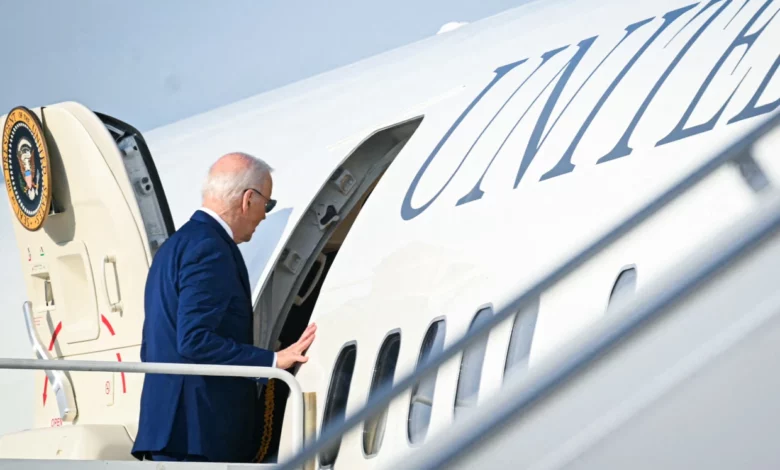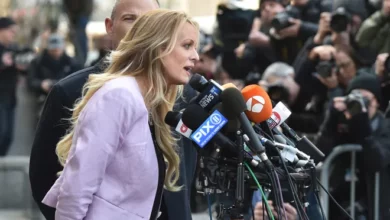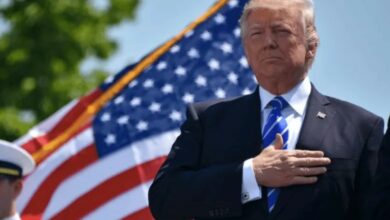Biden travels to Europe to commemorate the defeat of dictators
In the background of the president's trip to France this week will be his rematch against Donald Trump, who questioned some of the pillars of the post-World War II order.

WASHINGTON — President Joe Biden leaves the campaign trail this week and flies to France for the 80th anniversary of D-Day, where he’ll give speeches touting American alliances that beat back dictatorships bent on world conquest.
Biden is in a long string of presidents who have delivered that sort of message over the years as they built and sustained a Western bloc rooted in free markets, democratic governance and individual freedoms.
As yet unknown is whether he’ll be the last.
The race between Biden and Republican Donald Trump is a toss-up at this stage, and if Trump returns to power, there are no assurances he would keep the basic pillars of the post-World War II order intact.
As president, Trump considered pulling out of the NATO alliance, which has been a bulwark against Russian aggression since the depths of the Cold War, according to his former national security adviser John Bolton. A senior Trump White House official said in an interview that Trump came within a “wisp” of dropping out of NATO at a summit meeting in Brussels in 2018.
More recently, Trump said he would let Russia to do “whatever the hell they want” to European countries that didn’t spend enough on military defense.
The trip is a chance for Biden to draw policy distinctions with his opponent while also demonstrating to skeptical voters that, at 81, he retains the stamina and acuity to negotiate with his counterparts, some of whom are decades younger.
His speeches will inevitably offer an implicit rebuke of the “America First” approach that Trump championed in office.
“This is a very important opportunity for President Biden to reaffirm our NATO alliance and emphasize that the world is really on the cusp of a turning point,” said Sen. Chris Van Hollen, D-Md., a member of the Foreign Relations Committee. “We are living through the middle of the fight for democracy and freedom over authoritarianism.”
Biden will speak in Normandy on Thursday, the anniversary of the June 6, 1944, beach landings that presaged the liberation of Europe and the defeat of the Nazis.
He’ll speak again Friday at Pointe du Hoc, where U.S. Army Rangers scaled sheer cliffs to take out German guns and gain a toehold on France’s northern coast. A focus of Biden’s remarks will be the defense of “freedom and democracy,” according to the White House.
There is a certain political symmetry to the speech. In 1984, President Ronald Reagan also spoke at Pointe du Hoc while he was running for re-election. He gave a memorable address that built to the rhetorical crescendo: “These are the boys of Pointe du Hoc.”
Reagan went on to win re-election in a landslide over Democrat Walter Mondale.
“Biden will probably try to hit those same notes that unify everybody,” said James Melville, a former U.S. ambassador to Estonia who spent 34 years working for the State Department. “I’m sure the political folks are looking at that [Reagan’s speech] and thinking how do they steal some of that magic.”
After meetings in Paris on Saturday with French President Emmanuel Macron, Biden is scheduled to return home. Days later he’ll leave again for southern Italy, where he will attend a Group of Seven summit of the world’s most advanced economies.
Biden will be in friendly company in his back-to-back European journeys. He has forged respectful ties with many of his foreign counterparts over a 50-year-career in public office honing his diplomatic skills.
By contrast, Trump’s overseas appearances were more fraught, sometimes culminating in feuds with allies and bonding moments with authoritarian rulers.
After he said he wouldn’t sign a joint statement on common values with other G7 nations in 2018, Trump voiced displeasure with Canadian Prime Minister Justin Trudeau, tweeting that a news conference he had given was “very dishonest & weak.”
“He got into spats with the Canadians,” Sen. Chris Coons, D-Del., a member of the Foreign Relations Committee, said in an interview. “The Canadians are the nicest people in the world! How do you make the Canadians mad?”
Leaders consider hard national interests when they conduct foreign policy, and whether they prefer Trump or Biden on a personal level, they grasp that come Jan. 20, they may dealing with one or the other.
The uncertainty surrounding the presidential race is the backdrop for Biden’s meetings with officials who will be watching for clues as to how the election might go.
Keith Kellogg, a senior national security official in the Trump White House, noted that in the run-up to the election, various foreign officials have come to see Trump. Among them have been Hungarian Prime Minister Viktor Orbán and former British prime minister David Cameron, who now is the country’s top diplomat.
“What you’re going to see is European leaders hedging their bets,” Kellogg said in an interview. “You have former presidents and prime ministers talking to President Trump. They’re wondering what it is going to happen in the election and where they’re going to go.”
Asked whether Trump would withdraw from NATO in a new term, Kellogg said, “I don’t expect him to do something like that,” adding that Trump “does expect them to live up to what they have promised to do.”
Emphasizing that he wasn’t speaking for Trump, Kellogg suggested an alternative arrangement in which the U.S. might agree to protect NATO countries that contribute at least 2% of their gross domestic product to defense. Under such a “tiered” system, countries that failed to meet the threshold wouldn’t be entitled to such protection from the U.S., said Kellogg, who is seen as potential defense secretary in a Trump administration.
Nothing enhances a president’s prestige like a foreign trip. He arrives in his magnificent blue-and-white plane. Often he is greeted on the tarmac by bands, performers and smiling counterparts grateful to see the commander in chief of a global superpower.
It makes for compelling imagery in an election season, but much can go wrong. If Biden trips at any point, if he slurs his speech or —exhausted by the time change — if he appears feeble or uncertain, he would rekindle doubts about whether he’s up to the job.
Whatever President George H.W. Bush might have accomplished during a visit to Japan in 1992 — the year he lost re-election — the takeaway for most Americans was that, ailing, he vomited at a dinner hosted by the prime minister.
William Cohen is a former Republican senator from Maine and defense secretary in President Bill Clinton’s administration. He is a friend of Biden’s who plans to vote for him and do what he can to help him win in November.
During the coming trip, Cohen said, Biden “has the burden of persuading them [world leaders] that he can carry the vote here. He has to present himself as a more vigorous, dynamic person than he has to date.
“The real issue for them [other leaders] is can he persuade the American people that it’s important for him to win,” Cohen continued in an interview. “And if he can’t persuade the American people, then they’re going to take their bets and put them elsewhere.”




